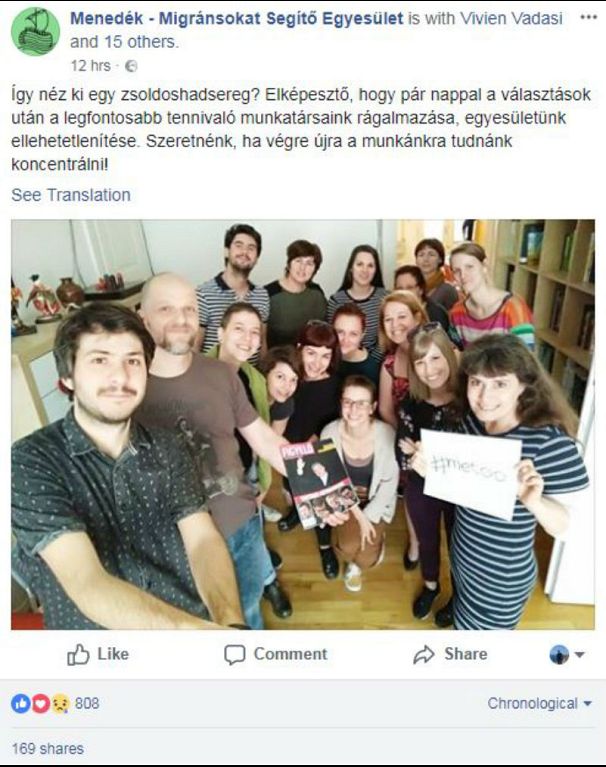The Budapest university founded by George Soros has joined in the condemnation after a pro-government magazine published a list of academics and others, accused of wanting to overthrow Viktor Orban's government.
Human rights activists, anti-corruption campaigners and journalists are among those identified in Hungary as “mercenaries” working for George Soros, accused of wanting to overthrow the government and install thousands of illegal migrants in the country.
 ADVERTISEMENT
ADVERTISEMENT
 ADVERTISEMENT
ADVERTISEMENT
The Figyelo Weekly magazine has published a list of around 200 names of people it claims are part of a “mysterious network” linked to the billionaire philanthropist.
They include teachers, lecturers, members of rights groups and NGOs, investigative reporters and officials from the Central European University (CEU) in Budapest, which was founded by Soros. Many of the names appear on the public websites of the organisations concerned.
The publication comes days after the resounding re-election of Viktor Orban’s Fidesz Party last Sunday for a third consecutive term. Last month, the prime minister said he knew the names of 2,000 members of the “Soros mercenary army”.
The CEU has strongly condemned the list as “contemptible”. “This is a flagrant attempt at intimidation that is dangerous for academic freedom and therefore for all of Hungarian academic life,” its President and Rector Michael Ignatieff said in a statement.
Employees of the campaign groups Amnesty International and Transparency International are included on the list. Both organisations have vowed to continue their activities.
Contacted by Euronews, Transparency International’s Executive Director Martin Jozsef Peter said they were taking legal advice. “Although Transparency International and I are personally critical of the government, this is normal in democracy,” he said. “It is not the first such attack, but it is the first when not only organisations and their leaders, but also their associates, are singled out.”
He added that 13 percent of Transparency International’s budget comes from Soros’ Open Society Foundation, which like its main sponsor the European Union, funds specific projects and not the organization in general.
Julian Ivan, Amnesty’s director in Hungary, said in a statement on its website that he felt “sadness and anger”.
“Today’s list is another attempt to intimidate civil organisations and their members and supporters,” he said, adding that they were not afraid. “We will continue our work and represent the values that the Hungarian government has long forgotten.”
The list has raised eyebrows, not least because five people on it are actually dead. Figyelo has apologised to their families. One of them, a law lecturer, was a devoted government supporter according to his son.
The article’s author, Andras Csanady, has no previous publications to his name. He has claimed it was impossible to find the names of some working for Soros’ foundation – yet according to the online daily 24.hu they are publicly available on its website.
Orban and his supporters have attacked Soros and his foundations, accusing them of wanting to allow thousands of immigrants into Hungary. The prime minister’s vociferous opposition to migration was the major issue in his election campaign. Critics say the language used against Soros, who is Jewish, has anti-Semitic undertones.
The CEU says it is determined to stay in Budapest “despite such attempts at intimidation”. Earlier this week, fresh from its election victory, a Fidesz spokesman said a so-called “Stop Soros” law could be passed in May, allowing the government to ban non-governmental organisations that support migration and pose a “national security risk”.
On Thursday the Hungarian government dismissed a report by a European Parliament committee calling for disciplinary proceedings to be instigated against Budapest under Article 7 of the EU Treaty, which could result in sanctions. “The Soros Empire increases the pressure on the Hungarian people,” said Peter Szijjarto, Hungary’s Minister of Foreign Affairs and Trade.
The draft text by Dutch Green MEP Judith Sargentini says Hungary has failed to uphold the EU’s core values, and outlines concern about judicial independence, corruption, freedom of expression and minority rights.
Some in Hungary believe that the best weapon in response to the “mercenary list” is humour. A petition has been launched on behalf of people not on it, and who demand to be included.
One group, the Relief Society – Migrant Association, posted a photo of its activists on Facebook asking “does a mercenary army look like this?”. “We would like to concentrate on our work again,” it added.












